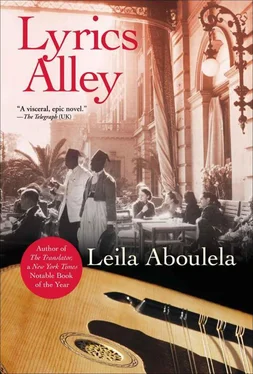Leila Aboulela - Lyrics Alley
Здесь есть возможность читать онлайн «Leila Aboulela - Lyrics Alley» весь текст электронной книги совершенно бесплатно (целиком полную версию без сокращений). В некоторых случаях можно слушать аудио, скачать через торрент в формате fb2 и присутствует краткое содержание. Год выпуска: 2011, Издательство: Grove Press, Жанр: Современная проза, на английском языке. Описание произведения, (предисловие) а так же отзывы посетителей доступны на портале библиотеки ЛибКат.
- Название:Lyrics Alley
- Автор:
- Издательство:Grove Press
- Жанр:
- Год:2011
- ISBN:нет данных
- Рейтинг книги:5 / 5. Голосов: 1
-
Избранное:Добавить в избранное
- Отзывы:
-
Ваша оценка:
- 100
- 1
- 2
- 3
- 4
- 5
Lyrics Alley: краткое содержание, описание и аннотация
Предлагаем к чтению аннотацию, описание, краткое содержание или предисловие (зависит от того, что написал сам автор книги «Lyrics Alley»). Если вы не нашли необходимую информацию о книге — напишите в комментариях, мы постараемся отыскать её.
Lyrics Alley — читать онлайн бесплатно полную книгу (весь текст) целиком
Ниже представлен текст книги, разбитый по страницам. Система сохранения места последней прочитанной страницы, позволяет с удобством читать онлайн бесплатно книгу «Lyrics Alley», без необходимости каждый раз заново искать на чём Вы остановились. Поставьте закладку, и сможете в любой момент перейти на страницу, на которой закончили чтение.
Интервал:
Закладка:
Something in Nur changed, as if he was suddenly recalled to what was important and urgent. ‘Yes, I do. But nothing I consider to be strong or, indeed, special. You were very kind to encourage me when I first started.’
‘Because you have talent.’ Badr took a long drag. ‘And, with time, you will become more skilful and more in control of your poems’ qafiyas and wazn.’
He remembered what was endearing and memorable about Nur as a student — the boy’s genuine desire to learn, not just for the sake of school marks, not just out of fear of examinations. Perhaps Nur could be of help to him. Try, he urged himself, now that the boy is beaming with pride at the compliment you paid him. Try and persist, it just might work after all.
He took a breath. ‘What was it they were talking about inside? An apartment block?’
‘Yes, my father is building an apartment block.’
‘Just like the ones in Cairo?’
Nur laughed. ‘Yes, right in the middle of Khartoum. It will be the first high-rise in the city. In Newbold Street, next to Hoash Boulus. The ground floor will be leased to shops and offices and the top floors will be residential.’
‘When will it be ready?’
‘In eighteen months or more — I would say 1952, to be on the safe side. The work progresses steadily, but at times it can come to a halt if the materials are delivered late.’
Badr took a deep breath and blurted out, ‘Would your father be so kind as to lease me a flat for my family and I to live in? A small flat with two rooms would be more than enough. I have, may Allah be praised, four children, and my elderly father is not well at all. We are in wretched housing now. My wife complains, and there is no privacy, it’s not proper at all. . dreadful. And today I received a letter from my cousin. He wants to come to Sudan to look for work! Of course, he intends to stay with me and I am obliged to host him. But where am I going to put him? All I have is one room and we’re all sitting on each other’s laps as it is!’
Nur laughed at the choice of words.
Badr took a drag from his cigarette. It was humiliating to complain to this boy, this heir to a fortune. Yet pride was a luxury Badr could not afford.
‘I’ll ask him,’ said Nur, smiling with confidence. ‘He will surely lease you a flat. My father has great plans for this building. He wants Egyptian taste and expertise — itself borrowed from Europe — to be firmly placed in Sudan. Do you know how this saraya came to be built? Father was driving his motor car along a boulevard in Heliopolis and stopped to marvel at a Pasha’s mansion. He then contacted the architect and said, “Design one like it for me in Umdurman.” The materials, too, from the marble tiles to the garden lamps, were shipped from Italy via Egypt.’
On their way out, they passed the bustle and delicious smells of the hoash. Hajjah Waheeba was inspecting the laden trays, making sure that every dish was represented before being dispatched to the men.
She turned and said to Badr, ‘Stay and have dinner.’
Nur repeated his mother’s invitation. The huge round trays were too heavy for one servant to carry on their own, and family members swarmed around the trays, ready to lift them up. Nur was summoned to help and he excused himself. Even though he was hungry, Badr refused the invitation not only out of modesty, but for a genuine desire to go home. He wanted to be with Hanniyah tonight, to entertain her with descriptions of Mahmoud Bey’s bedroom, and he needed to go back to put his father to bed. Also, Hanniyah could not be trusted to supervise the children’s homework. He must do that himself, for it would be a disgrace if his children were not the top of their classes. The saying that the carpenter’s door was unhinged must not apply to him. And, most of all, he wanted to eat with his family. He derived considerable satisfaction from watching his children eat. Every bite that rose from the plates to their mouths was halal, the result of his sweat and exertions all day.
Badr made his way back to the tram station with Nur’s promise ringing in his ears: ‘ My father will surely lease you a flat in his new building .’ Out of habit, and too many instances of dashed hopes, cynicism gripped him. The boy was naïve. If Mahmoud Bey really did agree to lease him a flat, he would have to charge Badr below the market price. He would understand that Badr could not afford the high rent of the city centre and he would be obliged to do him a favour as the private teacher of the Abuzeid children. That was why Mahmoud Bey might not agree. But it was worth trying, and Badr was determined to petition Madame Nabilah, too. As a fellow Egyptian, she might sympathise with his predicament and put in a good word for him with her husband.
As he narrowly avoided placing his foot on donkey manure, his mind drifted to the rumours that the British would thwart a union with Egypt. If the position of the Egyptian teaching mission were jeopardised to the extent that they had to pull out, how pointless his dream of moving house would be.
The sudden call to prayer from a nearby mosque jolted him out of his thoughts. It felt like a reprimand, a reminder of why he was alive. To struggle for the here and now but not lose sight of the end: to put meat in his children’s small mouths and sweets in Hanniyah’s enchanting mouth. To fulfil and pacify her, she who held his heart and was, so often, the cause of his disturbance. To act like a man and discipline her, so that she would keep on looking after his father and not complain. This was a considerable source of stress, as were the intrigues and rivalries of the school, the reluctant and stupid students, the darting to and fro from one private lesson to the next. And, above all, his horror at how his energetic, bellowing father had been reduced to confused, dependent blubber. It was a horror that was abating with time and being replaced by a grim, constant sadness. The kind of sadness that deserved no condolence and was too dispersed for sighs and platitudes. Badr’s tumultuous, humdrum life. What was it all for, where was it heading? The answer peered at him now as it had done before and would do again. His life was a journey. A journey towards the day when Allah Almighty would look at him, really look at him, look through him, inside him, know him, and then would call him by his name. Ya Badr.
III
For Nabilah, the Sudan was like the bottom of the sea, an exotic wilderness, soporific and away from the momentum of history. It was amazing but constricting, threatening to suck her in, to hold her down and drown her. Sometimes she was able to hold her breath and accept, but on most days she struggled to rise up to the surface, working to recapture a routine like that of her mother in Cairo, a life of fresh air and energy, the natural bustle and order of civilised life. Nabilah knew that she should be more flexible, that she should adjust, but she was not easy-going enough, and too conscious of her status.
She had, with her husband’s full approval and generous finances, designed her wing in the saraya like a modern, Egyptian home, not a Sudanese one. Instead of a hoash, there was a shaded terrace with a wicker table and chairs where, in winter, she could sit and enjoy her afternoon tea, while watching Ferial ride her tricycle and Farouk kick a ball in the garden. Instead of the traditional beds lining the four walls of the sitting room, she had spacious armchairs, a settee, and, in pride of place, her gramophone. It was a proper room, a room to be proud of. Guests reclining and sitting on beds, angharaibs made of rope being the only furniture in a room, the intimacy and privacy of a bed laid out for public eyes and use — was something that particularly infuriated her. It was, she believed, a sign of primitiveness, proof that the Sudanese had a long way to go. Meals too, in Nabilah’s quarters, were served in the dining room, around a proper dining table, with knives, forks and serviettes, not clusters of people gathering with extended fingers around a large round tray, while sitting on those very same beds she had so many objections to. Her household staff, too, was all from Egypt — Chef Gaber, whose Turkish dishes inspired so much envy from her co-wife, as well as the children’s nanny. Nabilah surrounded herself with the sights, accents and cooking smells of Egypt, closing the door on the heat, dust and sunlight of her husband’s untamed land.
Читать дальшеИнтервал:
Закладка:
Похожие книги на «Lyrics Alley»
Представляем Вашему вниманию похожие книги на «Lyrics Alley» списком для выбора. Мы отобрали схожую по названию и смыслу литературу в надежде предоставить читателям больше вариантов отыскать новые, интересные, ещё непрочитанные произведения.
Обсуждение, отзывы о книге «Lyrics Alley» и просто собственные мнения читателей. Оставьте ваши комментарии, напишите, что Вы думаете о произведении, его смысле или главных героях. Укажите что конкретно понравилось, а что нет, и почему Вы так считаете.











